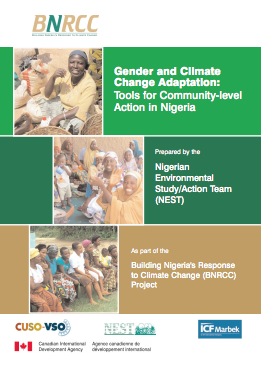Prepared by the Nigerian Environmental Study/Action Team’s (NEST) as a part of the Building Nigeria’s Response to Climate Change (BNRCC) Project, the new publication “Gender and Climate Change Adaptation Tools for Community-Level Action in Nigeria” presents a gender-sensitive approach to climate change adaptation in Nigeria, a country whose people are experiencing and reacting to changes in rainfall patterns, storm surges, and increased heat.
The impacts of climate change, whether they are gradual changes on natural resources and agriculture or more cataclysmic events like flood, are felt differently by either gender. This report effectively charts climate change impacts on women in Nigeria and their current strategies for adaptation. For example: In Nigeria, some wells are drying up, forcing women and children to travel further to collect water and firewood. Women’s strategies for adapting to water insecurity include harvesting rainwater and purchasing water from vendors.
The publication also provides roadmaps to ensure gender integration in all stages and aspects of climate change projects and policy across Nigeria and examines the effectiveness of BNRCC pilot projects. We were particularly interested to read the case studies of these projects which take a look at, amongst other things, the establishment of a fish farm in coastal Nigeria whose operations and proceeds will be managed by a committee of men and women, and the use of fuel-efficient closed chamber wood stoves for cooking in a rural forest community. Tools for ensuring gender integration into climate change projects and policy include:
- The Gender Equality Framework, a framework to support the mainstreaming of gender in climate change projects
- The Gender Integration Checklist, to be used as a guide for ensuring gender mainstreaming at different project phases
- The Gender-Sensitive Stakeholder Analysis, which illuminates the different roles men and women play in a project, and how the project affects them
- The Gender Monitoring Matrix, a monitoring system that uses quantitative and qualitative indicators in matrix or table form




